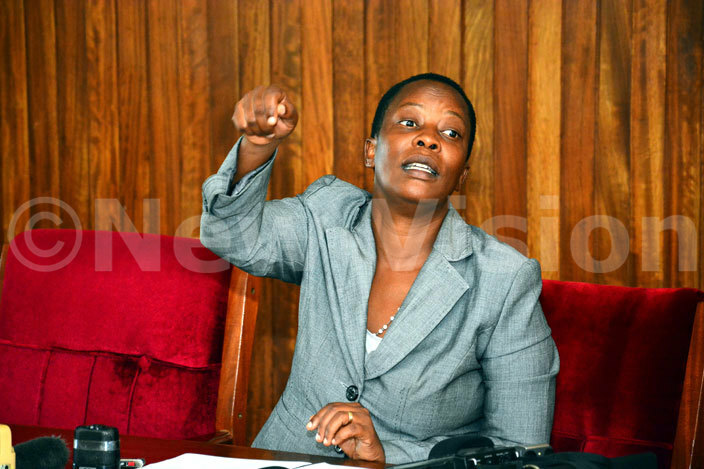Govt to list landlords with many tenants
Aug 05, 2016
This measure, Obbo stressed, will open up the land to be parceled out to sitting tenants by the government.

PIC: Lands minister, Betty Amongi. Photos/Ronnie Kijjambu
The ministry of lands will soon come up with a list of landlords with heavily tenanted land that cannot be used for investment or any other economic entrepreneurship initiatives, the ministry spokesperson, Dennis Obbo, has said.
Obbo told the New Vision that the list will help identify landlords who are willing to sell their registered land on a willing buyer-willing seller basis.
This measure, Obbo stressed, will open up the land to be parceled out to sitting tenants by the government.
"There are tenants who don't have any legal documents showing how they occupied the land, who don't pay busuulu (nominal ground rent), who don't know their boundaries and their landlords. As a result of this we have disharmonious relationships between the landlords and tenants," he said.
Lands minister, Betty Amongi said once they get the list, a mediation team of government will facilitate landlords and ‘bibanja' holders to negotiate among themselves so as to reach a consensus.
"That is one option where ‘bibanja' holders can free a portion of land to the landlord if the latter wants to develop it so that they can all benefit from the land. The Government will then compensate the landlord for that land,'' Amongi said.
She said the second option will be for the government to out rightly negotiate with the landlords to buy the land and issue titles to ‘bibanja' holders after registering their interests on it.
"We have started having landlords who are willing. I have so many landlords, who have filled forms from Nakasongola, Mukono and Kibaale. So we are now going into negotiations with these landlords so that the Government valuer can value their land and we start paying them off," she said.
Obbo, however, said institutional land such as the Kabaka's land in Buganda kingdom will be excluded.
"Institutional land can't be sold unless otherwise. The only thing that can be done is to make sure tenants on that land get proper documents and either get a lease or a certificate of occupants. Once the occupants have any of those documents they can never be evicted," Obbo said.
He said the landlords who will not come out it will mean they are having harmonious relationships with bibanja holders and are comfortable with the government laws and are implementing them to the letter.
"After coming up with a list we shall categorise the tenants. Those in urban areas like the tenants on the late Nelson Ssebugwawo's land in Nkumba will pay economic ground rent which will be fixed by the minister and those in rural areas will remain paying nominal ground rent," he explained.
Amongi said their move will definitively solve the crisis of land evictions that is on the rise throughout the country, but more rampant in Buganda.
"The President has proposed that we should come up with the list of the landlords in Buganda, Bunyoro and parts of Ankore and Tooro where the landlords have tenants on their land," she said.
President Yoweri Museveni recently said those evicting people mainly use the ignorance of the bibanja owners and the corruption and collusion of the Gombolola Chiefs, Miruka Chiefs, the Magistrates, Security personnel and the Resident District Commissioners.
Saturday Vision has learnt that the move was also prompted by claims by tenants that some landlords had stopped them from growing perennial crops such as coffee and cocoa given to them by Operation Wealth Creation.
Reactions
Kayunga district NRM chairperson, Moses Karangwa, a prominent landlord, said if it is a willing buyer-willing seller basis, it will work.
"It means I can get money from my land and do other businesses. The problem is somebody to come and force people to go away. That is unacceptable and people will go to court," Karangwa said.

Betty Nambooze. Photo/Miriam Namutebi
Mukono Municipality MP, Betty Nambooze, welcomed the move but said the Land Fund that was established, among others, to help tenants by occupancy in acquiring titles, had not been operated efficiently.
"We need to free a lot of land and give it to government but how has government handled the land it has acquired? We came up with the land fund to pay off absentee landlords willing to sell their land to government, but we don't know what happened to it and nobody can give us accountability," she said.
She called for a comprehensive study on land issues to be able to come up with a good land policy. "The way they are introducing this is a suspect and people don't trust this government," she said.
Uganda enjoys a diverse system of land tenure, which has evolved significantly since colonial times.
Observers say it remains difficult, however, to transform land use to spur higher levels of productivity.
"One cause is the difficulty involved in transferring ownership of land from one entity to another, particularly under communally owned land in the north and north-eastern regions, and under the mailo land, which has overlapping rights in the central region," Christina Malmberg Calvo, the Country Manager of The World Bank for Uganda, said recently.
